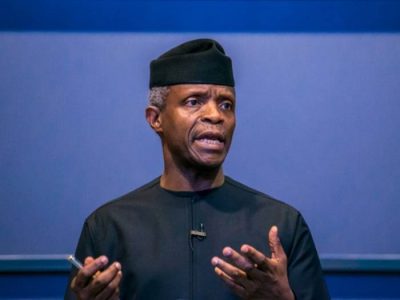Nigeria’s export grows by 60 per cent – FG
•Tax revenue expands by 51 per cent
Nigeria’s exports appreciated by 59.9 per cent between 2016 and 2017, the Federal Government said yesterday.
Tax revenue jumped by 51 per cent last year.
Vice President Yemi Osinbajo and Minister of Budget and Planning Udoma Udo-Udoma gave the figures at the FT Nigeria Summit on “Dispelling Uncertainty and Building Resilience’’ in Lagos.
The minister said the implementation of the Economic Recovery and Growth Plan (ERGP) gave rise to the export boost, driven by the non-oil sector.
He said the agricultural sector’s export grew from N6.7 billion in 2016 to N170 billion in 2017. Yam was among the products exported.
Udoma said solid minerals export also rose from N44 billion in 2016 to N102 billion in 2017.
Speaking on the theme: “Delivering economic resilience”, he said the ERGP and other policies had made great impact on the economy.
Udoma said the country’s business climate had improved with the government focusing on creating an environment for private sector investment.
“We have tackled those issues that made Nigeria not to be competitive in the past, such as ease of getting visas and acquiring land, among others,” he said.
The minister said the growth of other indices, such as foreign reserves, inflation rate, Gross Domestic Product were encouraging and made the economy more resilient.
“We have built up our foreign reserves, in June 2016 it was 26.51billion dollars but today it’s about 44 billion dollars,” the minister said.
He said the growth in the country’s reserves was achieved with prudent management.
He explained that the ERGP was a plan developed after a extensive consultation and was built on the work of the previous government.
According to him, the plan was designed to achieve more prosperous economy where Nigerians grow what they eat.
“It is to raise the productivity of Nigeria and Nigerians. We want to be a major engine of production where we produce enough for ourselves and enough for export to other countries.
“The plan drives the budget and drives all government activities,” he said.
Udoma said the plan helped the economy to get out of recession and ro become resilient.
He said the country had achieved 15 consecutive months of decline in inflation rate, which he said was still high.
“It is not where we want it to be, our target is single digit of nine per cent.
It is still too high but it is moving in the right direction,” Udoma said.
He added that the gap in exchange rate between the parallel market and official market was also narrowing and stabilising.
Udoma said the administration inherited a very challenged economy that was highly dependent on one commodity.
He explained that over 70 per cent of government revenue and 90 per cent of foreign exchange earnings depended on crude oil in the past.
Vice President Osinbajosaid the 51 per cent growth year- on-year was due to aggressive tax policies introduced by the Federal Government.
Speaking on “Nigeria beyond oil- The pathway to transformation’’, Osinbajo said “Aside from oil, tax revenues have gone up by 51 per cent in 2017. We are recording high tax revenue in the history of the country.’’
Osinbajo said that tax to Gross Domestic Product (GDP) would be above six per cent it used to be, going by growth recorded in tax revenue.
On external debt, he assured Nigerians that the current debt profile was still small and nothing to worry about when compared to thev GDP.
Osinbajo said that the country’s debt to GDP was 21 per cent, compared with Ghana that was around 70 per cent and South Africa 50 per cent, USA 101 per cent.
He stated that the country’s debt to revenue as at Nov. 2017 was 34 per cent down from about 60 per cent in the past.
“The reason why we have the alarmists is because this is only a snapshot, if you take a snapshot of Nov. 2017, you are not looking at revenue, you might say that the debt is very high.
“So, you cannot respond to these things by snapshot because you are not taking into account the revenue.
“Our external debt is not something we should worry about, we have managed debt very well,’’ he said.
On privatisation, he said that government was still committed to privatisation exercise and was too looking at assets that needed to be privatised.
He said that government would concession General Electric and the four major airports in the country.
Managing Director, Financial Times Live/Global Conferences & Events Mr James Gunnell, said that the summit would further brighten Nigeria’s complex economic and investment climate.
The summit would enable senior policy makers, major international investors, and multilateral organisations to put forward concrete recommendations and realistic solutions aimed at facilitating growth and overcoming the challenges the country was facing. (The Nation)


